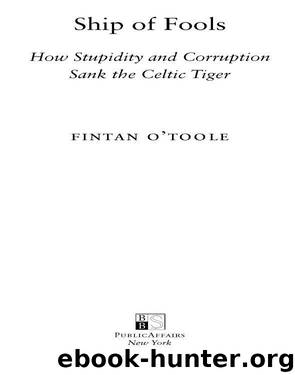Ship of Fools by Fintan O'Toole

Author:Fintan O'Toole
Language: eng
Format: epub
Publisher: PublicAffairs
The effects on an economy dangerously dependent on construction would, he warned, be catastrophic: ‘We could see a collapse of government revenue and unemployment back above 15 per cent.’
Bertie Ahern’s response to Kelly’s (entirely accurate) predictions was to urge him and his ilk to kill themselves. ‘Sitting on the sidelines, cribbing and moaning is a lost opportunity. I don’t know how people who engage in that don’t commit suicide.’ Ahern got strong support from his main media cheerleader, the bestselling Sunday newspaper the Sunday Independent, whose deputy editor Liam Collins wrote that ‘Bertie Ahern got it absolutely right’ and attacked the Economic and Social Research Institute for having the bad taste even to publish Kelly’s paper: ‘The state-funded Economic & Social Research Institute set the stalled ball rolling again last week when it regurgitated a hysterical rant from an academic who had the audacity to accuse those in the property business of “wishful thinking” because they remained optimistic about the future of house prices. Professor Morgan Kelly, from the bloated campus of University College Dublin, first jumped on the property bandwagon on December 21, 2006, with his paper, Irish House Prices: Gliding into the Abyss? When not too many people paid much attention to his thesis, the state “think tank” reissued his gloom-laden forecast under the new guise of academic research. It came with complicated formulae, big words and long, hard-to-read paragraphs - but the same dismal conclusions. ’ Collins accused Kelly of ‘tabloid scholarship’.
What was remarkable, however, was how few mainstream economists came to Kelly’s defence. Every historically literate economist knew for sure that the Irish property boom was going to crash. As early as August 2000, the International Monetary Fund put the Irish bubble in the context of all known modern property booms and concluded that ‘there has not been a single experience of price inflation on the scale of Ireland’s which did not end in prices falling’. Given that prices actually doubled in the six years after that warning, the scale of the crash was even more predictable. Yet the overwhelming majority of Irish economists either contented themselves with timid and carefully couched murmurs of unease or, in the case of most of those who worked for stockbrokers, banks and building societies and who dominated media discussions of the issue, joined in the reassurances about soft landings.
In effect, the cheerleaders for the Celtic Tiger had constructed an impregnable but entirely fictional reality. It was an unquestionable certainty as secure as the Tsar’s conviction that there could be no revolution in Russia or Donald Rumsfeld’s conviction that there were weapons of mass destruction in Iraq. In a country that was losing its religion, the indestructibility of the property market was the remaining one true faith. Were it not for the unfortunate restrictions of modern civility, heretics like Kelly would have been burned at the stake in O’Connell Street. Unreality was now the place where Ireland lived.
Download
This site does not store any files on its server. We only index and link to content provided by other sites. Please contact the content providers to delete copyright contents if any and email us, we'll remove relevant links or contents immediately.
| Africa | Americas |
| Arctic & Antarctica | Asia |
| Australia & Oceania | Europe |
| Middle East | Russia |
| United States | World |
| Ancient Civilizations | Military |
| Historical Study & Educational Resources |
Room 212 by Kate Stewart(5121)
The Crown by Robert Lacey(4817)
Endurance: Shackleton's Incredible Voyage by Alfred Lansing(4783)
The Iron Duke by The Iron Duke(4356)
The Rape of Nanking by Iris Chang(4213)
Joan of Arc by Mary Gordon(4110)
Killing England by Bill O'Reilly(4001)
Say Nothing by Patrick Radden Keefe(3985)
I'll Give You the Sun by Jandy Nelson(3447)
Shadow of Night by Deborah Harkness(3368)
Hitler's Monsters by Eric Kurlander(3343)
Mary, Queen of Scots, and the Murder of Lord Darnley by Alison Weir(3210)
Blood and Sand by Alex Von Tunzelmann(3205)
Eleanor & Park by Rainbow Rowell(3173)
Darkest Hour by Anthony McCarten(3133)
Margaret Thatcher: The Autobiography by Thatcher Margaret(3082)
Book of Life by Deborah Harkness(2939)
Red Famine: Stalin's War on Ukraine by Anne Applebaum(2934)
The One Memory of Flora Banks by Emily Barr(2863)
